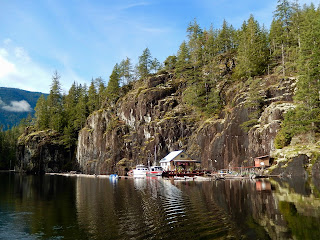Float Cabin Living : Do you have a telephone?
 |
| Our float cabin home on Powell Lake, BC. |
A telephone makes our life in a remote area more comfortable. It provides a measure of safety that wasn’t available to pioneering families, but we keep our calls to a minimum so they don’t interrupt our lifestyle. Here's what we use.
Satellite Telephone Service
 |
| Image from Globalstar.ca |
Disadvantages include high cost, outdoor use unless you have an external antenna, you need good sky exposure for optimal signal strength, and signal degradation occurs in rain and wind (when we wanted it the most!). So next we explored cellular options.
Cellular Telephone Service
Our cabin is at the ragged edge of cell reception. Digital coverage reaches 5 to 8 miles. To improve our connection, we added a Wilson cell booster package with an external antenna. Indoors there's a powered booster and an antenna to distribute the signal a sort distance.
Cellular advantages for us include: a more consistent indoor connection, lower overall cost (by no means cheap), and we don’t have to stand under an umbrella juggling a phone to keep it aligned with a satellite on a windy, rainy night.
 |
| Signalboost Desktop wireless at cabin. |
Cellular advantages for us include: a more consistent indoor connection, lower overall cost (by no means cheap), and we don’t have to stand under an umbrella juggling a phone to keep it aligned with a satellite on a windy, rainy night.
Other Communication Options
Walkie-Talkies
Two-way radios have a price range from cheap with limited range and frequency controls, to expensive. We chose a Midland GXT1000 that has a range of 36 miles. We use these on hikes and quad rides. Walkie-talkies have a push-to-talk button and only one radio can transmit on a channel at a time. They are not private. Anyone within range on your channel can listen, but in the bush they are handy.
Handheld and Base Station Radios
Two-way radios allow you to send and receive. Advantages include: some are cheaper than cell phones, there's no service contract, and no monthly charges. Disadvantages include: you can only communicate with someone on the frequency you are using, they are limited by distance, and calls are not private. Antennas and base stations can extend the range. We use three handhelds, one for boating, one for logging roads, and one in the plane. In addition, our barge has a marine radio that works on the lake.
Other Cabin Technology Posts
Wilson Signal Boost for Cellular and Internet
Telus Wireless Internet with USB Key
Canon Portable Printer
Xplornet Satellite Internet (can also be used for phone service)
These are some voice communication used by people in a remote areas. Evaluate your communication needs and options before making a decision. For us, cellular was the better choice augmented with radio communication. -- Margy
 |
| Our Midland walkie-talkies |
Handheld and Base Station Radios
 |
| Marine band radio in the barge at the cabin. |
Other Cabin Technology Posts
Wilson Signal Boost for Cellular and Internet
Telus Wireless Internet with USB Key
Canon Portable Printer
Xplornet Satellite Internet (can also be used for phone service)
These are some voice communication used by people in a remote areas. Evaluate your communication needs and options before making a decision. For us, cellular was the better choice augmented with radio communication. -- Margy





















You really need all the technology out there!
ReplyDeleteIt's our primary home so it helps. Before we had to take the boat to town for just about everything. Now we have phone, Internet and TV (via the Internet). Times they are a changin'.
Delete